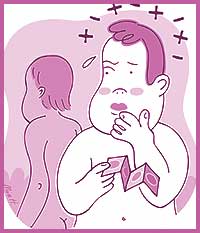Mike is 19, HIV-negative and regularly seeks casual sex in bathhouses and on the Internet. He’s careful. Mostly.
“I have turned down sex with men because they were positive,” says Mike. “I can’t say I ask all the time, but if I have a feeling that the person might be positive I do ask…. If I wanted to have unsafe sex, I would definitely ask the person’s status.”
People like Mike seem rare in the casual sex scene, as many men are not asking their partner’s HIV status at all.
It’s partly because many men are taking precautions all the time and consider their partner’s status to be none of their business. In other cases, men say it breaks the sexiness of the situation.
But perhaps the most interesting reason is that men feel the codes of the casual sex game restrict communication too much.
“You’re talking safer sex in, frankly, an unsafe environment,” says Jair, 27, speaking of his encounters in washrooms and parks. “People are not talking. That’s part of the game – tacitly implied.”
Jair says he’s HIV-negative as far as he knows. He says when people ask him his status, it seems like a ritual, not real interest.
“There’s an urge to give them the correct answer so things can go forward,” he says. “It’s almost like, ‘If you’re positive, I’m leaving.’ It’s asked to make the person feel that unsafe sex is permissible.”
Part of the not talking is tied to the fear of rejection positive men face.
“I’ve met men who have told me they’re positive before we’ve had sex,” says Scott, 32. He says they have a lot of anxiety.
“As if they expect me to dump them or run away. It totally doesn’t make a difference. I couldn’t care less one way or the other,” says Scott. “I’ve had lots of HIV-positive partners, who have been out to me about having HIV. I still treat them the same way. We still have great sex. I still fuck them and they fuck me.”
Scott hasn’t been tested for six years and doesn’t know his status. Although he tries to never have unsafe sex, Scott says he’s occasionally slipped up. In these instances, his partners have often asked his status – afterwards.
“The guy’s asking me, praying to God I’m negative and I can’t reassure him. It’s a pretty human reaction afterwards, once you come back to your senses, but it’s a little late by then, isn’t it?”
In casual encounters, men often don’t believe their partners’ response anyhow, believing men will say whatever it takes to get the sex they want. Alternatively, if a partner is willing to have unprotected anonymous sex, then he isn’t likely to know his status anyway.
“I stumble upon people whose ad says they’re negative and looking for a bareback partner,” says Paul, a 45-year-old HIV-positive guy, of cruising the Internet. “They might honestly believe they’re negative. I don’t think there’s a lot of safety in that.”
Men are not only silent about their concerns for their own health. Many of the men I talked to say they’ve witnessed unsafe situations while cruising, but didn’t speak up. In one washroom scene, Jair was being blown by a guy who had dropped his pants to jerk off. A third man entered the stall and began fucking his partner without a condom, without asking.
Scott has had a similar situation occur at a sex party.
“The thing that disturbed me was one of the men was really young, 18, right, and this other guy was just really going at him like crazy without a condom,” says Scott. “Quite often I’m in situations where I feel like I’m condoning unsafe sex by being silent. I felt depressed afterwards, knowing that this 18-year-old kid was potentially [at risk] and I was there and I didn’t say anything.”
The fact that a lot of casual encounters are nonverbal means that negotiations of whether to have safe or unsafe sex are usually left to imprecise signals.
“It depends where people are having sex,” says Paul. “If people are having sex in a bathhouse, [a person’s preference] is usually communicated by the presence or absence of condoms in the room.
“If you see someone lying on his stomach, he’s a bottom. If you don’t see condoms in the room and he’s on his stomach you can assume he’s open to barebacking.”
Most of Paul’s partners are his age and have been a part of the generation most experienced with AIDS and HIV. This experience leads to particular conclusions.
“If there’s no suggestion that condoms should be used, coming from the bottom, then there’s the assumption that he’s positive.”
While positive men tend to assume that only positive men like themselves would be taking such a risk, studies in San Francisco suggest the same thing goes for negative men, who often assume that any partner not using a condom would also be negative.
Men are taking serious risks and how they’re negotiating those risks is varied and faltering. Unfortunately, every time a negative partner and a positive partner have sex there’s a possibility of a new infection – whether they know each other’s status or not.

 Why you can trust Xtra
Why you can trust Xtra


